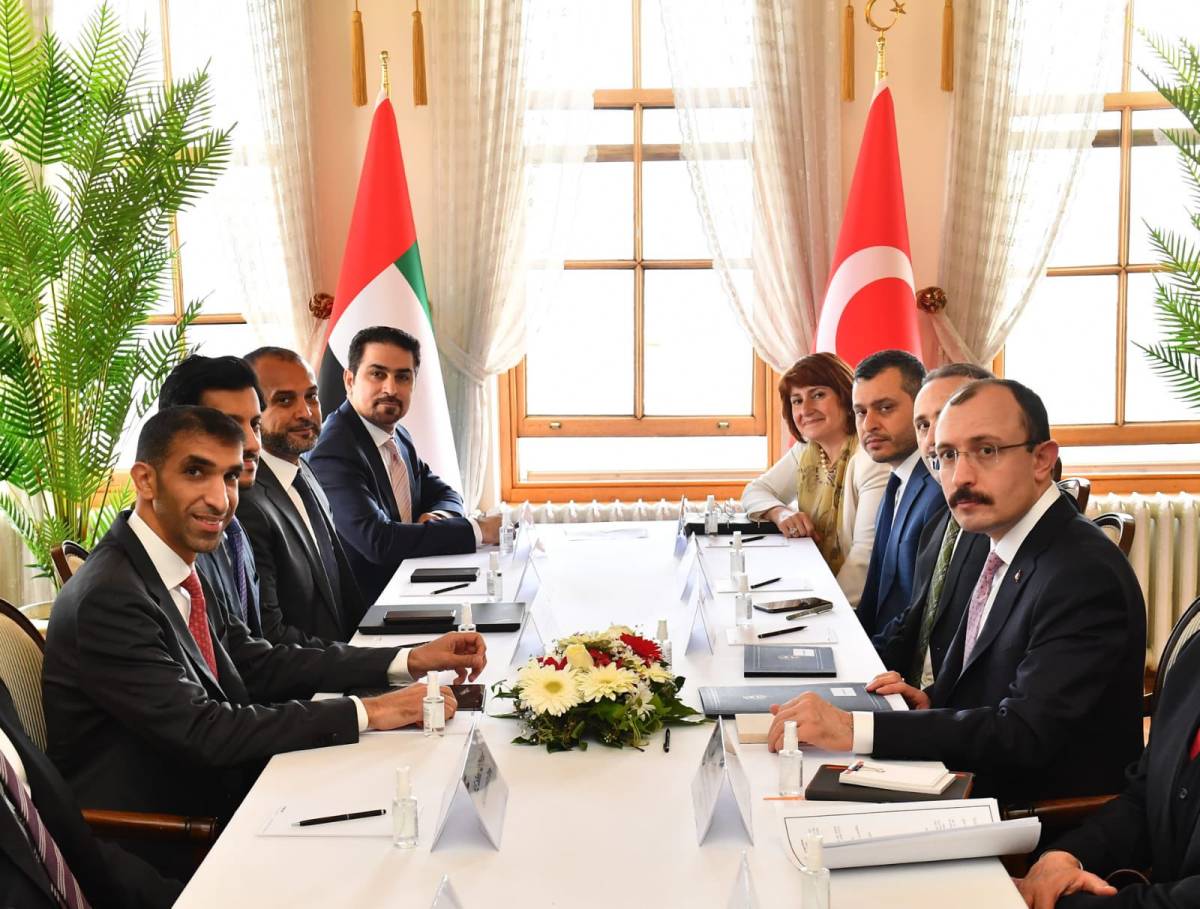Al Zeyoudi highlighted the elements of the new economic module of the UAE based on flexibility, proactiveness, and openness to international markets.
Dr. Thani bin Ahmed Al Zeyoudi, Minister of State for Foreign Trade and Mohamed Mosh (Mehmet Muş), Minister of Trade of Turkey discussed different initiatives to foster business and investment partnerships between the business communities of the two countries during a round table held in Istanbul.
The two ministers also discussed ways to utilise the qualitative leaps recently achieved by bilateral and economic relations, and arrangements for finalising the forthcoming Comprehensive Economic Partnership Agreement (CEPA) between the two countries.
The meeting came as part of the visit of an official and business delegation to Turkey led by Al Zeyoudi.
He asserted that there are strong historical relations and ties between the UAE and Turkey and that the two sides are looking forward to strengthening cooperation in all areas in view of the common desire to develop economic partnership to higher levels in a sustainable manner.
This, he said, will serve the development agenda and the business communities of both the two countries to move towards more sustainable and resilient economies and achieve progress for the peoples.
UAE-Turkey relations have witnessed positive development and cooperation in all the areas of mutual interest, following the visit of Sheikh Mohamed bin Zayed Al Nahyan, Crown Prince of Abu Dhabi and Deputy Supreme Commander of the UAE Armed Forces, to Turkey by the end of 2021; and President Recep Erdogan’s visit to the UAE in February 2022, which resulted in the signing of around 72 agreements and Memorandums of Understanding (MoUs) in various fields.

Al Zeyoudi said, “We look forward to maximising the cooperation between the two countries during this historic phase and stimulating it towards more momentous levels in several strategic sectors in the coming days. We have recently announced the launch of formal discussions to reach a CEPA with Turkey as part of the Global Economic Agreements Programme within the UAE’s ‘Projects of the 50’. Today, we continue our work with our partners in the Turkish Government and the private sector in Turkey to finalise the arrangements of this Agreement and formally sign it, paving the way for a new shift in both countries’ relations in the areas of trade, investment, talent exchange, and knowledge sharing.”
He added, “The volume of non-oil trade between the UAE and Turkey has reached about AED 50.4 billion in 2021, growing by 54 per cent as compared to 2020, which had witnessed an increase of 86 per cent against 2019. Ankara accounts for more than 3 per cent of the UAE’s non-oil foreign trade volume. In addition, UAE investments in Turkey rose to over AED 18.3 billion by the end of 2020, while Turkish investments in the UAE amounted to AED 1.1 billion by the end of 2019.”
Al Zeyoudi highlighted the elements of the new economic module of the UAE based on flexibility, proactiveness, and openness to international markets.
He further shed light on ‘Projects of the 50’ and the amendments adopted by the country to promote the competitiveness of its legislative economic system as well as the leading technological infrastructure and attractive incentives in investments and attracting talents.
He also called upon the business community in Turkey to benefit from the growing economic collaboration between the two countries and explore promising growth prospects in the UAE market, which is rich with developmental and prosperity incentives. “The business community should benefit from the strategic location of the UAE as an active logistic window for Turkish products to reach the markets in the Middle East, Asia, and Africa, as well as the technologically developed infrastructure. Not to mention empowering companies to build regional and international networks for its brands, hence ensuring more profits, development, and growth,” he added.
ALSO READ: UAE, US review climate change, energy
Moreover, both sides explored new prospects to encourage businessmen and companies to increase and diversify trade, as well as promote the influx of mutual investments and businesses.
They further emphasised on promoting knowledge and talents exchange between the two countries in priority sectors during the upcoming stage – including renewable energy, financial and bank sector, entrepreneurship and SMEs, advanced technology and innovative industries, logistic support (such as transportation, freight, and civil flights), agricultural sector, food security, healthcare, and tourism.
The delegation included Saeed Al Dhaheri, the Ambassador of the UAE to the Republic of Turkey, Juma Al Keet, Assistant Under-Secretary for Foreign Trade Affairs at the UAE Ministry of Economy, Abdullah Alshamsi, Assistant Under-Secretary, Industry Growth, at the Ministry of Industry and Advanced Technology, Sameh Abdulla Al Qubaisi as Director General of Economic Affairs at the Abu Dhabi Department of Economic Development, Fahad Al Gergawi, Chief Executive Officer of Dubai Investment Development Agency (Dubai FDI), Mohamed Sharif Habib Mohamed Al-Awadi, Director-General at Fujairah Free Zone Authority, Mohammed Juma’a Al Musharrakh, the Chief Executive Officer (CEO) of the Sharjah FDI Office (Invest in Sharjah), as well as a number of UAE governmental officials and businessmen. As from the Turkish side, the round-table meeting witnessed the participation of Nail OLPAK, the President of the Turkish Foreign Economic Relations Board (DEİK).

Leave a Reply